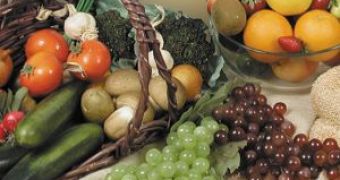A recent study conducted by Patricia Guenther, a nutritionist at the U.S. Department of Agriculture's (USDA) Center for Nutrition Policy and Promotion and her team found that too few of the US population consume the recommended daily amount of fruits and vegetables. This happens despite the fact that all Americans seem to be aware of the fact that fruits and vegetables are overloaded with vitamins and nutrients and are therefore crucial for a good health.
The new recommendations, which are part of the USDA's MyPyramid program, state that people should eat two to six and a half cups of vegetables and fruits daily, depending on the gender and age of the consumers.
Findings found that teenage boys are the worst fruits and vegetables consumers, with less than 1% of them eating the recommended servings of natural food. On the other hand, infants aged between 2 and 3 are the most constant fruits and vegetables consumers, with 48% of them getting the recommended amount of natural food. Somewhere in-between there are women aged 51 to 70, of whom only about 17% eat the recommended cups of fruits and vegetables.
Researcher Guenther stated that the results are "not good" and informed that the team "used data from the National Health and Nutrition Examination Survey III from 1999 to 2000. We had complete data on 8,070 people, ages 2 and up." The findings of the study are published in the Journal of the American Dietetic Association.
Cynthia Sass, a registered dietitian in Tampa, Fla., and a spokeswoman for the American Dietetic Association added that people are not concerned with diversifying the fruits and vegetables they eat; instead, they tend to consume 'easy' fruits, such as bananas, and vegetables in salads: "People gravitate toward the 'easy' fruits and vegetables, such as bananas and bagged salad mixes."

 14 DAY TRIAL //
14 DAY TRIAL //